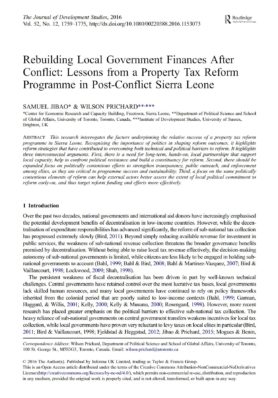The Journal of Development Studies Volume 52, Issue 12
This research interrogates the factors underpinning the relative success of a property tax reform programme in Sierra Leone. Recognising the importance of politics in shaping reform outcomes, it highlights reform strategies that have contributed to overcoming both technical and political barriers to reform. It highlights three interconnected arguments. First, there is a need for long-term, hands-on, local partnerships that support local capacity, help to confront political resistance and build a constituency for reform. Second, there should be expanded focus on politically contentious efforts to strengthen transparency, public outreach, and enforcement among elites, as they are critical to programme success and sustainability. Third, a focus on the same politically contentious elements of reform can help external actors better assess the extent of local political commitment to reform early-on, and thus target reform funding and efforts more effectively.
